Expert Garden Maintenance in Hampstead: Keeping Your Green Space Pristine
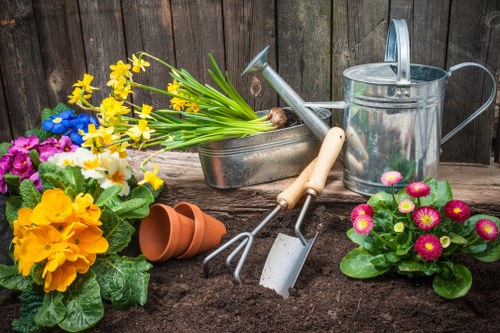
Maintaining a beautiful garden in Hampstead requires dedication, knowledge, and the right approach. Whether you’re a seasoned gardener or a beginner, understanding the intricacies of garden maintenance in Hampstead is essential to ensure your outdoor space remains vibrant and healthy throughout the year.
Hampstead’s unique climate and soil conditions present both opportunities and challenges for garden enthusiasts. By choosing the right plants and employing effective maintenance strategies, you can create a stunning garden that thrives in this picturesque London neighborhood.
In this comprehensive guide, we’ll explore various aspects of garden maintenance in Hampstead, offering practical tips and insights to help you achieve and sustain a gorgeous garden.
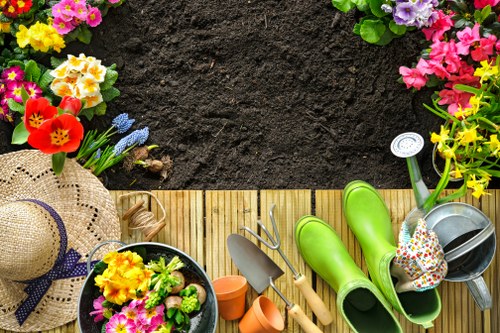
Understanding Hampstead’s Climate and Soil
Hampstead enjoys a temperate climate with mild winters and warm summers, making it an ideal environment for a wide range of plants. However, understanding the specific climate patterns and soil types in Hampstead is crucial for effective garden maintenance.
The soil in Hampstead varies, but it is generally well-drained with a good mix of clay and loam. Conducting a soil test can help determine the pH levels and nutrient content, allowing you to make informed decisions about soil amendments and plant selection.
By tailoring your garden maintenance practices to Hampstead’s climate and soil, you can ensure that your plants receive the optimal conditions they need to flourish.
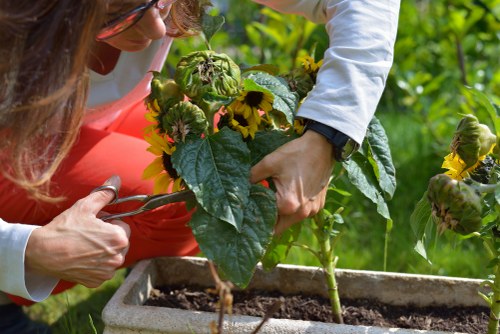
Seasonal Garden Maintenance Tasks
Spring
Spring is a crucial time for garden maintenance in Hampstead. As the weather warms, it’s essential to prepare your garden for the growing season ahead.
Key tasks include:
- Pruning dead or damaged branches
- Fertilizing plants to promote healthy growth
- Planting new flowers and vegetables
Summer
During the summer months, maintaining adequate moisture levels is vital. Regular watering, especially during dry spells, helps keep your garden lush and vibrant.
Additional summer maintenance includes:
- Weeding to prevent competition for nutrients
- Mulching to retain soil moisture and suppress weeds
- Monitoring for pests and diseases
Autumn
Autumn is the time to prepare your garden for the colder months. Cleaning up fallen leaves, aerating the soil, and planting cover crops can enhance soil health and prevent erosion.
Essential autumn tasks:
- Planting bulbs for spring blooms
- Protecting sensitive plants from frost
- Composting garden waste
Winter
In winter, garden maintenance focuses on protecting plants and planning for the next growing season. Pruning deciduous trees and shrubs, covering sensitive plants, and maintaining garden tools are key activities.
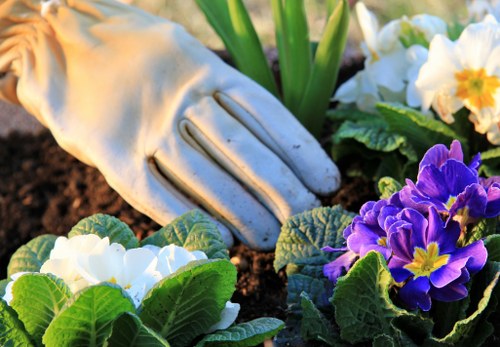
Choosing the Right Plants for Hampstead Gardens
Selecting plants that are well-suited to Hampstead’s climate and soil conditions is a fundamental aspect of garden maintenance in Hampstead.
Consider the following when choosing plants:
- Hardiness: Ensure plants are hardy enough to withstand Hampstead’s temperature ranges.
- Soil Compatibility: Match plant preferences with your garden’s soil type.
- Sunlight Requirements: Choose plants based on the amount of sunlight different areas of your garden receive.
Popular plant choices in Hampstead include:
- Rhododendrons and azaleas for vibrant spring colors
- Ornamental grasses for texture and movement
- Vegetables and herbs for edible gardens
Perennials vs. Annuals
Understanding the difference between perennials and annuals can help you plan a dynamic and sustainable garden. Perennials return year after year, reducing the need for replanting, while annuals offer seasonal bursts of color.
Incorporating a mix of both can enhance the visual appeal and resilience of your Hampstead garden.
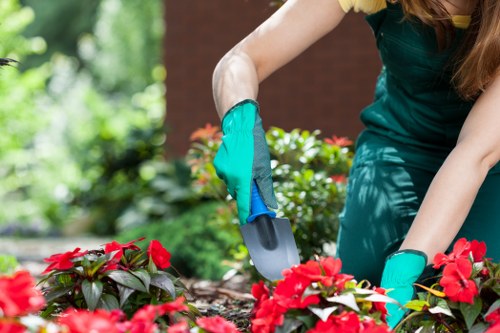
Essential Garden Maintenance Practices
Regular Watering
Consistent watering is key to maintaining a healthy garden. Installing an efficient irrigation system can save time and ensure your plants receive the necessary moisture.
Pruning and Trimming
Regular pruning helps maintain plant health, encourages growth, and improves the overall appearance of your garden.
Weed Control
Keeping weeds at bay prevents them from competing with your plants for nutrients and water. Manual weeding, mulching, and using eco-friendly herbicides are effective strategies.
Soil Care
Maintaining healthy soil involves regular testing, adding organic matter, and ensuring proper drainage. Healthy soil supports robust plant growth and resilience against pests and diseases.
Pest and Disease Management
Proactively managing pests and diseases helps protect your garden from infestations and outbreaks. Utilize integrated pest management (IPM) techniques for sustainable control.
Mulching
Applying mulch helps retain soil moisture, regulate temperature, and suppress weed growth. Organic mulches like bark or compost are beneficial for soil health.
Fertilizing
Providing the right nutrients is essential for plant growth. Choose fertilizers based on your soil test results and the specific needs of your plants.
Tool Maintenance
Keeping your garden tools clean and sharp ensures efficient and safe gardening practices.
Professional Garden Maintenance Services in Hampstead
While DIY garden maintenance is fulfilling, sometimes professional assistance is necessary to achieve the best results. Garden maintenance in Hampstead can be expertly managed by local gardening services that understand the area’s specific needs.
Benefits of hiring professionals include:
- Expert knowledge of local plant species and soil conditions
- Access to specialized tools and equipment
- Time-saving and efficient upkeep
Professional gardeners can provide a range of services, from regular maintenance and seasonal clean-ups to landscape design and installation.
Choosing the Right Service Provider
Selecting a reputable garden maintenance service in Hampstead involves considering factors such as experience, customer reviews, and the scope of services offered.
Ensure that the company is:
- Licensed and insured
- Experienced with Hampstead’s climate and soil
- Capable of customizing services to meet your specific garden needs
Cost of Professional Maintenance
The cost of professional garden maintenance in Hampstead varies based on the size of your garden, the complexity of tasks, and the frequency of services. Investing in professional maintenance can enhance the beauty and longevity of your garden.
Budgeting Tips
- Obtain multiple quotes to compare services and prices
- Discuss your budget and specific needs with potential providers
- Consider long-term benefits and return on investment
Long-Term Benefits
Regular professional maintenance not only keeps your garden looking immaculate but also promotes sustainable growth and reduces the likelihood of costly repairs or replacements in the future.
Contact us today to schedule a consultation and discover how our expert services can transform your Hampstead garden.
Sustainable Gardening Practices in Hampstead
Embracing sustainable gardening practices contributes to the health of your garden and the environment. Implementing eco-friendly techniques in garden maintenance in Hampstead can lead to a more resilient and beautiful outdoor space.
Composting
Composting garden waste reduces landfill usage and enriches your soil with essential nutrients. Set up a compost bin to recycle kitchen scraps and garden debris.
Water Conservation
Efficient watering practices, such as drip irrigation and rainwater harvesting, help conserve water and ensure your plants receive adequate moisture without waste.
Organic Pest Control
Using natural predators and organic pesticides minimizes the impact on beneficial insects and maintains the ecological balance of your garden.
Native Plants
Incorporating native plant species supports local wildlife and typically requires less maintenance, as they are well-adapted to Hampstead’s conditions.
Reducing Chemical Use
Avoiding synthetic fertilizers and herbicides protects the soil and water quality, fostering a healthier garden ecosystem.
Benefits of Sustainable Practices
- Enhanced soil fertility and structure
- Improved plant health and resilience
- Conservation of natural resources
Community Impact
Sustainable gardening not only benefits your personal garden but also contributes positively to the broader Hampstead community by promoting environmental stewardship.
Book your service now to integrate sustainable practices into your garden maintenance routine.
Enhancing Garden Aesthetics in Hampstead
Creating a visually appealing garden involves thoughtful design and maintenance. Here are some strategies to enhance the beauty of your Hampstead garden:
Landscape Design
Effective landscape design considers the layout, plant selection, and structural elements to create a harmonious and inviting space.
Garden Structures
Incorporating elements like pergolas, gazebos, and garden paths adds character and functionality to your garden.
Lighting
Outdoor lighting highlights key features and extends the usability of your garden into the evening hours.
Color Coordination
Selecting plant colors that complement each other creates a cohesive and vibrant garden palette.
Seasonal Highlights
Planning for seasonal blooms and foliage ensures that your garden remains attractive throughout the year.
Focal Points
Establishing focal points, such as a water feature or a standout tree, draws the eye and adds interest to your garden layout.
Texture and Contrast
Mixing different plant textures and contrasts in foliage and flower shapes enhances the depth and dynamism of your garden.
Contact us today to discuss how we can help you elevate the aesthetics of your Hampstead garden.
Common Challenges in Hampstead Garden Maintenance
Even with the best care, gardeners in Hampstead may encounter specific challenges. Understanding these issues and knowing how to address them is part of successful garden maintenance in Hampstead.
Pest Infestations
Pests like slugs, aphids, and caterpillars can damage plants. Implementing proactive pest management strategies is essential to protect your garden.
Disease Prevention
Fungal and bacterial diseases can spread quickly if not managed. Ensure proper spacing, watering practices, and sanitation to prevent outbreaks.
Weather Extremes
Unexpected weather changes, such as heavy rain or prolonged droughts, can stress plants. Having contingency plans and protective measures in place helps mitigate these effects.
Soil Degradation
Over time, soil quality can decline. Regular soil testing and amendments help maintain its fertility and structure.
Labour Intensive Tasks
Tasks like weeding, pruning, and planting can be time-consuming. Hiring professional services can alleviate the workload and ensure tasks are done efficiently.
Mitigation Strategies
- Implementing integrated pest management (IPM)
- Using disease-resistant plant varieties
- Installing rainwater harvesting systems
Proactive Maintenance
Regular inspections and timely interventions are key to overcoming common garden challenges in Hampstead.
Book your service now to address and manage your garden’s specific challenges effectively.
Innovative Garden Maintenance Techniques
Embracing innovative techniques can enhance the efficiency and sustainability of garden maintenance in Hampstead.
Smart Irrigation Systems
Utilizing smart irrigation systems helps optimize water usage by automating and customizing watering schedules based on weather conditions and soil moisture levels.
Vertical Gardening
Vertical gardening maximizes space and adds visual interest, especially in smaller Hampstead gardens or limited areas.
Permaculture Principles
Incorporating permaculture principles fosters a self-sustaining ecosystem, reducing the need for constant maintenance and inputs.
Organic Fertilizers
Switching to organic fertilizers improves soil health and reduces environmental impact compared to synthetic alternatives.
Garden Automation Tools
Advanced tools and gadgets, such as robotic lawn mowers and automated feeders, streamline maintenance tasks and save time.
Benefits of Innovation
- Increased efficiency and time savings
- Enhanced sustainability and eco-friendliness
- Improved plant health and garden aesthetics
Future-Proofing Your Garden
Adopting innovative maintenance techniques ensures your garden remains beautiful and manageable amidst evolving gardening trends and environmental considerations.
Contact us today to explore innovative solutions for your Hampstead garden maintenance needs.
Conclusion: Achieving Garden Excellence in Hampstead
Effective garden maintenance in Hampstead involves a combination of knowledge, dedication, and the right strategies. By understanding the local climate, choosing suitable plants, and implementing sustainable practices, you can cultivate a garden that not only looks stunning but also thrives year-round.
Whether you opt for DIY maintenance or enlist professional services, the key is consistency and attention to detail. Embrace the beauty of Hampstead by nurturing your garden into a lush, vibrant oasis.
Book your service now and take the first step towards a breathtaking Hampstead garden.

